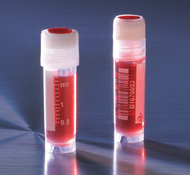What Kind of Plastic Tubes are Safe For Storing Cells in Liquid Nitrogen?
Posted by Stellar Staff on 23rd Feb 2020
The simple answer is: None are.
Inserting any kind of plastic tube into liquid nitrogen, even those called "cryovial", carries the potential for explosion, as this report from UCLA makes clear:
https://www.cls.ucla.edu/exploding-cryovial-injure...
Every cryovial manufacturer clearly states their vials are not to be used with LN2 in the liquid phase (-196C), but only in the gas phase, (-140 to -180C).
The reasons for this are simple.
There is a practical consideration of contamination whereby a liquid can transfer particles from one tube to another.
Additionally, no matter how tightly screwed closed a cryovial may be, it is always possible for a minute drop of liquid nitrogen to penetrate the interior.
When the tubes are then thawed, the liquid nitrogen rapidly expands, causing a blow-out and the potential for serious eye injury or damage to other parts of the body.
On a thread that appeared on Research Gate, Eduard Chani from Bethesda based Precision for Medicine noted: "1cc liquid nitrogen produces some 694cc vapor"; which explains the explosive force of trapped LN2.
If this is true for cryogenic vials, all the more so one must be careful not to store samples in screw-cap conical tubes like the common 15mL and 50mL tube, if they will be placed in liquid nitrogen.
What about snap freezing of samples or cells in a snap-cap microtube, what is often called an "Eppendorf" tube?
Here, there seems to be a diversity of opinion from laboratory technicians which may ultimately depend on the quality of the tube and the durability of the seal that is used to close the snap-cap.
On a Reddit post titled: "Eppendorf tubes bursting - tissues snap frozen in Isopentane" one comment suggests piercing the top of the cap with a hypodermic needle, presumably to reduce any pressure build-up.
Others recommend specific brands of microcentrifuge tubes known to offer a very durable cap lock (our Deadbolt micro centrifuge tube features the same mechanism and would be effective for this short term freezing)

Whether you are snap freezing or preparing cells for long term storage in liquid nitrogen, if a polypropylene plastic tube is your vessel of choice, be sure to fully understand your institution's safety protocols for safe handling and storage.
Stellar Scientific offers both internal and external thread cryovials that will safely protect your samples and your lab personnel when stored correctly in the vapor phase of liquid nitrogen.

